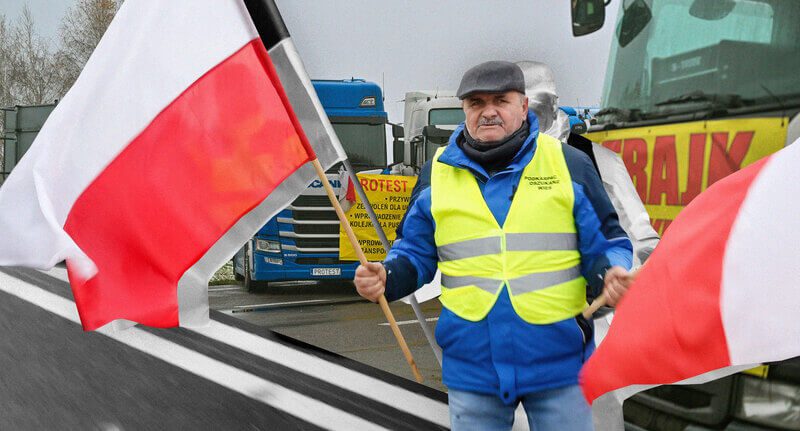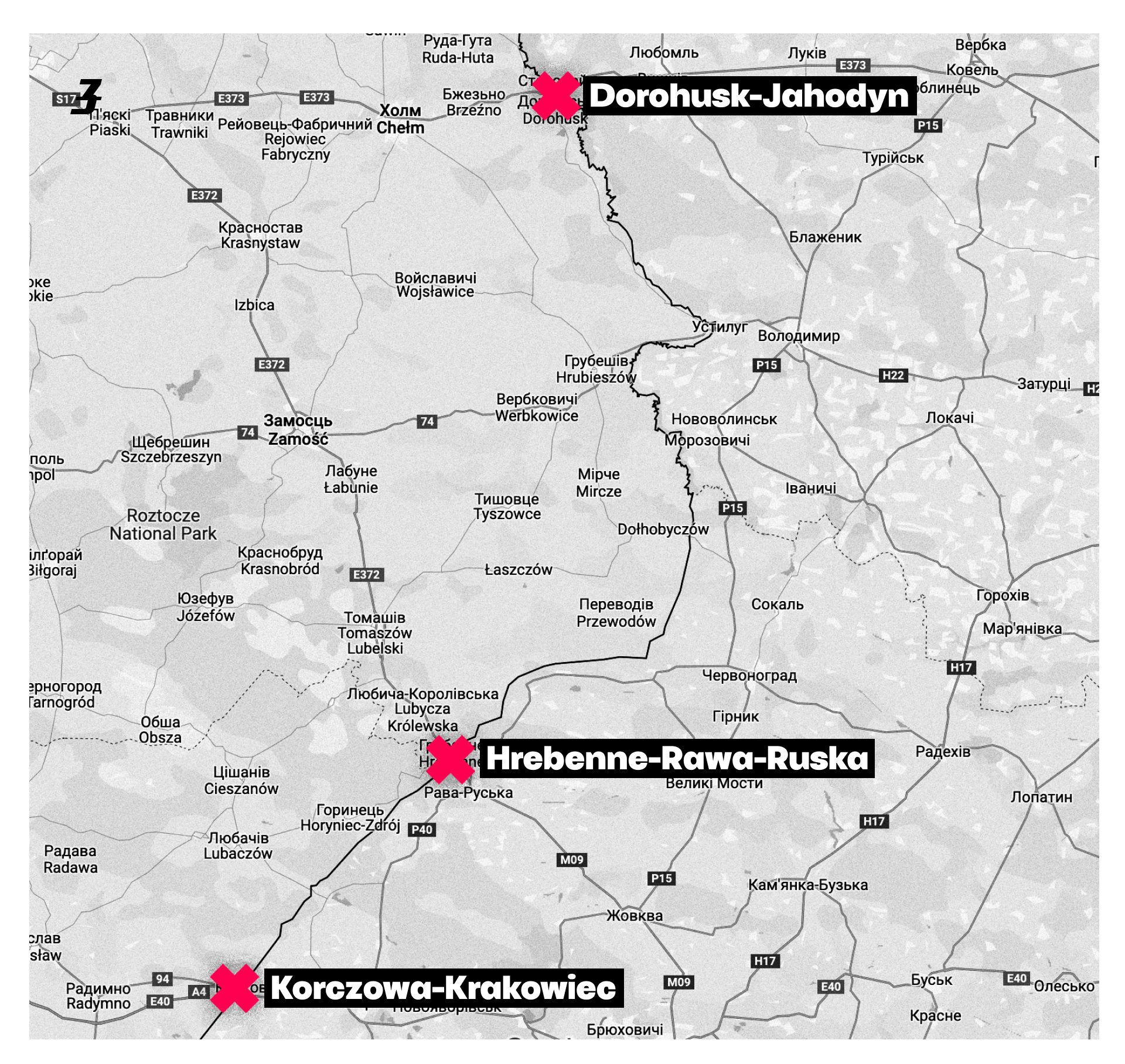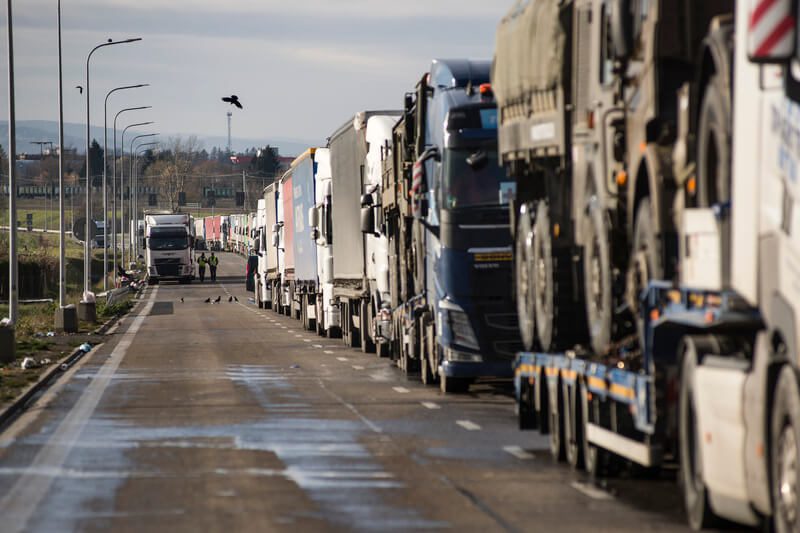New Crisis between Warsaw and Kyiv: Why Ending the Blockade of the Polish-Ukrainian Border Will Not Be Easy

The situation with the blocking of three border crossings with Ukraine by Polish carriers remains tense. On November 23, the protesters extended the strike to the fourth checkpoint, Medyka-Szegyni, and announced their intention to extend the blockade until February 1, 2024. Negotiations between representatives of the Ukrainian and Polish authorities did not yield any results. And the European Union has started talking about possible punishment for Poland if it does not deal with the situation on its part. But while politicians are sorting things out, Ukrainians are dying on the Polish border.
Zaborona’s editor Svitlana Hudkova found out how Ukraine became a hostage of internal political strife in Poland, who is behind the strike, and when to expect the border to be unblocked.
Ukraine-Poland border: blockade of trucks
On November 6, 2023, carriers from Poland went on strike on the border with Ukraine, blocking three checkpoints for the passage of freight transport: Korczowa-Krakowiec, Hrebenne-Rawa-Ruska, and Dorohusk-Jahodyn.

Infographic: Mariya Petrova / Zaborona
Among the main demands of the protesters is the return of permits for bilateral and transit transportation to the EU for Ukrainian carriers, which were canceled by the “transport visa-free regime”.
Among other demands are:
- To tighten transportation rules for foreign carriers;
- To prohibit companies with capital outside the EU from registering in Poland;
- To gain access to the Ukrainian Shlyakh system;
- To create a separate queue for cars from the EU in the eCherha system;
- To create a separate queue for empty trucks at all borders.
On November 16, representatives of the Ukrainian and Polish authorities once again held talks on unblocking the border crossing points. However, they failed to find a common solution with the carriers.
After that, Brussels also responded to the situation. According to the Polish media outlet Rmf24, citing sources, the European Commission may initiate a penalty procedure against Poland for Warsaw’s failure to resolve the problem of strikes by Polish carriers. It is not yet known what kind of fines may be imposed.
While the negotiations are ongoing, one of the leaders of Polish carriers, Rafal Mekler, said that the protesters decided to extend the blockade of the Yahodyn-Dorohusk checkpoint on the Ukrainian-Polish border until February 1, 2024. In addition, he announced the expansion of the blockade to the fourth checkpoint, Medyka-Szegyni, starting on November 23.
Deaths of truck drivers
Unfortunately, two Ukrainian truck drivers have already died at the Polish border due to the long-running strike by Polish carriers. The first case occurred on November 11 near the Dorohusk-Yahodyn checkpoint: a 54-year-old truck driver died while waiting to cross the border. The second case was reported on November 23. According to the vice president of the Association of International Road Carriers, Volodymyr Balin, a 56-year-old driver died at night in a parking lot in Korchova.

“There is information from the Polish police that it was a natural death. Although he was only 56 years old. But the details will come from the doctors,” Volodymyr Balin told Zaborona.
Regarding the conditions in which our carriers are currently staying, Balin says that the worst situation is now at the Dorohusk and Hrebenne checkpoints, with conditions for more comfortable waiting only at the border from the village of Korchova.
“There is an organized guarded parking lot, shops, rest areas, toilets, and showers nearby. In Hrebenne and Dorohusk they live in a line on the road, there are no conditions, only bio-toilets,” he said. Now there is also information that the throughput of trucks towards Ukraine at the checkpoint has been increased from one truck per hour to six. But this information needs to be confirmed, Balin said.
Problems on the border with Slovakia
To avoid waiting in lines, those who have the opportunity go to the Slovak and Hungarian borders, but Ukrainian carriers are promised problems there as well. On November 21, Slovak carriers staged a warning protest and blocked the only checkpoint at Vyshnye Nemetske – Uzhhorod. As of February 22, traffic was restored. However, according to the Slovak Union of Road Carriers UNAS, it was only a pause while they await the results of negotiations between the European Commission, representatives of Poland and Ukraine, which were to take place on November 22. UNAS is also trying to involve its Hungarian counterparts in the joint border blockade.
In turn, the Slovak government said it opposed such actions by local carriers and promised to hold consultations with the Slovak Ministry of the Interior to prevent such a protest.
According to the European Business Association, each day of the strike costs one company UAH 1 million. The estimated amount of losses since the start of the downtime has already amounted to at least UAH 306 million, affecting both importers and exporters. And according to the Federation of Employers of Ukraine, the blockade has caused losses to the Ukrainian economy of more than 400 million euros, Balin said.
Who is behind the strike: Ukraine has become a victim of political battles
The official organizer of the blockade of Poland’s border with Ukraine is Rafał Mekler, the owner of Rafał Mekler Transport, which was engaged in international transportation, in particular to Belarus and Russia. He is also the head of the Lublin branch of the far-right and anti-Ukrainian Konfederacja (Confederation) party, which won 7% of the vote in the last Polish elections and actively supports the protesters. But they are not the only ones interested in the situation, says Stanislav Zhelikhovsky, PhD in Political Science, international expert, in a commentary for Zaborona.

According to him, the reasons lie in the fact that in the coming days, the government may change in Poland and the new government will be headed by the head of the Civic Coalition party, Donald Tusk. Accordingly, the Prawo i Sprawiedliwość (Law and Justice) party of the current Prime Minister Mateusz Morawiecki and the Confederation will join the opposition.
“It is known that the association of Polish farmers “Deceived Village”, which is affiliated with the Confederation party, is now joining the strike. It was this movement that was involved in the farmers’ actions six months ago, which led to the “grain crisis” with Ukraine. Therefore, we can state that the leaders of this political force are interested in this protest,” explains Zhelikhovskyi.
But the PiS was also scoring political points before the October 15 parliamentary elections: “Now that we are talking about a possible change of government, I do not rule out that the PiS and the Konfederacja have entered into a tacit situational alliance. I assume that while the government is being formed, and throughout Tusk’s tenure as prime minister, they will obstruct his rule so that his political force loses support among Poles. Probable Prime Minister Donald Tusk himself is in a kind of a stretch, with the EU and Ukraine on one side and his voters on the other,” the international expert adds.
In his opinion, Tusk cannot openly oppose the protesters now. First of all, there is also a part of his electorate there. And secondly, his party signed a coalition agreement with the Polish Peasant Party, which protects the interests of Polish farmers — now they are allies against whom he will not go against either. Especially now, when Tusk needs to win a vote of confidence, unite the government, and govern the country.
Unfortunately, according to Stanislav Zhelikhovskyi, political strife in Poland is just beginning on the eve of local elections in 2024 and presidential elections in 2025, and Ukraine has become a victim of it.

Hundreds of trucks line the roadside to the Polish-Ukrainian border crossing in Medyka, Poland, November 23, 2023. Photo: Attila Husejnow / SOPA Images / LightRocket via Getty Images
Cargo on the border with Poland: when will it be unblocked?
It will be possible to reach a solution after the formation of a new government in Poland and with the mediation of the European Union.
“Perhaps the carriers will be able to get some preferences for themselves — this is the only way I see the issue being resolved. From the very beginning, the Polish strikers put forward demands that cannot be fulfilled, and I see no other options except for financial incentives for them and farmers,” the international expert says.
Brussels is unlikely to take tough measures for now, but if the situation is not resolved, Poland may face sanctions. Officials in Brussels are now to examine the legal grounds for the possible initiation of certain procedures against Warsaw. In its turn, Ukraine may initiate proceedings against Poland if the problem is not resolved, Zhelikhovskyi points out.
The Association of International Road Carriers has found lawyers ready to appear in Polish courts in the interests of our carriers to end the strike in court. “They are now making relevant requests for permission to strike and collecting facts of violation of the conditions announced by the carriers. We have information from the Ministry of Infrastructure that there are facts of blocking humanitarian cargo, which are being reported to the Polish authorities and the European Commission, which is also a violation by the strikers. We will investigate further,” said Balin.






